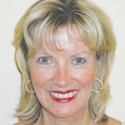
Endometriosis
with Lynne Singlewood
In this column I’m going to write about a very common disorder that I think many young women tend to be unaware of, Endometriosis.
This is a chronic inflammatory disorder in which abnormal growth of cells form in the lining of the uterus and instead of being shed during the menstrual cycle they tend to build up and attach to other organs, generally in the lower abdomen, such as the ovaries or the bowel. The growth of endometrial tissue occurs most often in, or on, the ovaries, the urinary bladder, the pelvic floor, and/or fallopian tubes, the backflow of menstrual blood containing endometrial cells can flow back through the fallopian tubes and take root and grow, or the tissue can occur in membranes that line the walls of the abdominal cavity, the most common site is believed to be deep in the pelvic peritoneal cavity.
The misplaced endometrial tissue responds to hormonal changes controlling the menstrual cycle, causing the tissue to grow, thicken, breakdown and bleed. This may causes inflammation, irritation, scar tissue, adhesions to surrounding tissues, possible infertility problems and severe pain during the menstrual cycle. As the blood from these adhesions has nowhere to go it can collect and form cysts on the ovaries, which, if they rupture can cause excruciating pain.
Symptoms of Endometriosis
Some of the symptoms of Endometriosis include excessive bleeding, including passing clots, pain and cramping before the menstrual cycle begins, three to five days of spotting before the menstrual cycle, incapacitating pain in the uterus, painful intercourse, nausea, pre-menstrual syndrome (PMS), constipation during the menstrual cycle, anaemia is common and pain while urinating. I believe some women just think a lot of the symptoms above are part of a normal menstrual cycle, but that’s not entirely accurate.
As some women with endometriosis don’t experience symptoms, the severity of pain does not indicate the degree or stage of the disorder. It’s been found that mild cases of endometriosis can have extensive pain while other individuals with advanced endometriosis may have little to no pain.
What causes Endometriosis?
Well it appears to have autoimmune, inflammatory and genetic factors, meaning that you might have inherited a gene from a family member making you more vulnerable to endometriosis. Autoimmune disorders are caused by the inflammation and destruction of tissues within the body by the body’s own Antibodies. Exposure to environmental influences such as polychlorinated biphenyls (PCBs) in plastics etc, found in house hold items and drinking bottles, along with dioxins which are chlorinated hydrocarbons found in feminine hygiene products such as tampons. Pesticides are another source of dioxins which may be absorbed into the body, where it collects in fatty tissue. These two types of hazardous waste materials may cause oestrogen dominance and trigger Endometriosis.
Something else to consider is that women who have Endometriosis appear to be more vulnerable to vaginal yeast infections, eczema and food sensitivities, so diet is really important. To find out if you have endometriosis a Laparoscopy is the most reliable form of diagnoses.
What can you do to help?
Firstly I would advise the use of organic cotton unbleached tampons, which can be found in health food stores.
Flaxseed meal can bind-up free oestrogen leaving less available to act on endometrial cells, this can be put in smoothies, sprinkled on salads, over cereals and put in cooking etc.
Try to eat real food, lots of fresh fruit and vegies along with plenty of leafy greens and less refined and processed foods which contain a lot of sugar, additives and salt, causing inflammation in the body.
Drink lots of fresh water and herbal teas and ease off the stimulants like coffee and caffeinated drinks.
There are a lot of beautiful herbs available which can help to reduce inflammation, balance your hormone levels and support the immune system, but you need to find a good practitioner to help you work out what is right for you, as each case is different and you need someone to treat you as the unique individual that you truly are.
Lynne Singlewood has taught Iridology and herbal medicine at Endeavour College, she also lectures Constitutional Iridology at WEA. She has a passion to help the community with their health and well being. Her deep love of iridology and herbal medicine is infectious. Ph: 0421618792 or email lynne@irishealth.com.au. Web site: www.irishealth.com.au